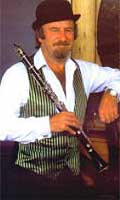Mr Acker Bilk
b. Bernard Stanley Bilk, 28 January 1929, Pensford, Somerset |
| Bilk and his band were perhaps
the most commercially oriented of the trad bands and were managed/promoted
by Peter Leslie. They wore striped Edwardian waistcoats and bowler hats
and their publicity often consisted of "an elephantine pastiche of Victorian
advertising prose, larded with unbearable puns" (Melly, 59). His West Country origins
were emphasized in the public figure (cider-drinking, belching) and,
ironically, became a national idol. Although he was apolitical, his
bowler became a symbol for many in the CND through association with
the music. He was very much the non-threatening "uncle" and was prominently
plugged on the BBC. Perhaps his most successful recording was another
tune rather atypical for trad bands, "Stranger on the Shore" [chrts
30 Nov 61], which was originally a children's show theme. However, the
band also performed blues standards like "Sister
Kate" that had qualities similar to British music hall ditties. |
| George Melly. 1970. Revolt into Style: The Pop Arts in Britain. London: Penguin Books. |
|
 |